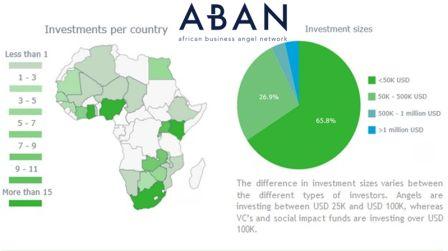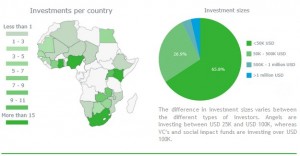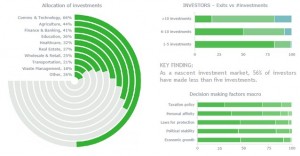2016 Venture Finance in Africa Facts and Figures Report by ABAN
Venture Finance in Africa – Facts & Figures
Access for ABAN Members to 2016 ‘Venture Finance in Africa’ Report
Innovative ventures yield high social and environmental impact and are a key driver for Africa’s development. Opportunity driven entrepreneurs are generating much of Africa’s employment, income and hope for a better future. But how are these companies and entrepreneurs progressing over time?
To help answer this question, ABAN proudly partners with and supports the ‘Venture Finance in Africa’ research by VC4Africa, the Africa platform for startup funding.
INVESTOR OVERVIEW:
EveryIyear VC4Africa reaches out to entrepreneurs and investors who are part of the community to find out more about their progress. Specifically, the 2016 edition looks at organizational advancement as measured by revenue growth and number of new jobs created.
This feedback underpins an annual benchmark for the companies listed on the platform, and offers tangible evidence of their impact.
The report breaks down insights across 5 parameters: employment, performance, investments, investors and ecosystem. If you would like to have more specific insights on certain regions or other findings please contact the research team: [email protected].
INVESTMENTS:
48%Iof the ventures are successful in securing external capital investment, compared to 44% last year. The average capital secured per venture increased from USD 130K in 2013 to USD 206K in 2014 and USD 326K in 2015. Most capital is secured by ventures from South Africa. Also the largest investments are made in South Africa. Most investments are made in Nigeria, followed closely by Kenyan ventures.
The difference in investment sizes varies between the different types of investors. Angels are investing between USD 25K and USD 100K, whereas VC’s and social impact funds are investing over USD 100K.
ABAN report
INVESTORS:
86%Iof the investors that took part in this research indicated that they had invested in an African venture. Angels represent one-third of the network, followed by Venture Capital firms and Social Impact Funds. Investors report management and team as being the most important factors they consider when investing. The country’s level of economic growth and size of market are the most important factors when deciding where to invest.
KEY FINDING:
As a nascent investment market, 56% of investors have made less than five investments.
CONCLUSIONS:
VC4AfricaIresearch shows an increasing number of businesses successfully growing their operations over time. From the most recent data, we know that entrepreneurs have been able to secure venture funding in 26 African countries. The challenge now is to reach entrepreneurs across markets.
The entrepreneurial base on the African continent is growing over time. More importantly the quality of the ventures is improving. As a result, we recognize three key trends that have considerable influence on the African startup funding landscape:
- Growing interest from African diaspora to invest in startups in their country of origin;
2.IThe increasing number of business professionals turning angel investor locally;
3.IA growing appetite for cross-border investing across Africa generally.
Here at ABAN we see that these trends highlight a change in mindset and a growing recognition of the opportunities and entrepreneurial talent coming from Africa. Yet, reliable empirical data on entrepreneurship and early stage investing in Africa is still hard to come by, and much more research is needed to help professionalize the sector.







